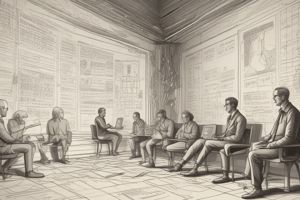Podcast
Questions and Answers
What is the primary purpose of open-ended questions?
What is the primary purpose of open-ended questions?
- To encourage detailed, qualitative answers. (correct)
- To limit responses to predetermined answers.
- To provide a yes/no format.
- To collect quantitative data only.
Which characteristic is crucial for ensuring that a question is unbiased?
Which characteristic is crucial for ensuring that a question is unbiased?
- Ambiguity
- Clarity
- Neutrality (correct)
- Specificity
What does the funneling technique in question sequencing refer to?
What does the funneling technique in question sequencing refer to?
- Using the same set of questions for all respondents.
- Rearranging questions randomly to reduce bias.
- Starting with general questions and moving to more specific ones. (correct)
- Asking specific questions before general ones.
Why is it important to avoid double-barreled questions?
Why is it important to avoid double-barreled questions?
What does the split-ballot technique aim to achieve in questionnaire design?
What does the split-ballot technique aim to achieve in questionnaire design?
What role does piloting play in questionnaire design?
What role does piloting play in questionnaire design?
Flashcards are hidden until you start studying
Study Notes
Types of Questions
- Open-ended questions: encourage respondents to provide detailed, qualitative answers
- Closed-ended questions: limit respondents to a specific set of answers (e.g., yes/no, multiple choice)
Question Characteristics
- Specificity: questions should be clear and concise, avoiding ambiguity
- Neutrality: questions should not be leading or biased, allowing respondents to provide honest answers
- Relevance: questions should be relevant to the research topic or objective
- Clarity: questions should be easy to understand, avoiding jargon or technical terms
Question Construction
- Avoid double-barreled questions: questions that ask two or more questions at once
- Avoid leading questions: questions that suggest a particular answer or perspective
- Avoid ambiguity: questions that can be interpreted in multiple ways
- Use simple language: questions should be easy to understand, avoiding complex syntax or vocabulary
Question Sequencing
- Funneling: starting with general questions and moving to more specific ones
- Randomization: randomizing question order to reduce bias and increase validity
- Split-ballot technique: dividing respondents into groups and asking different questions to each group
Questionnaire Design
- Introduction: provide clear instructions and context for the questionnaire
- Layout: use a clear and consistent layout to make the questionnaire easy to follow
- Piloting: test the questionnaire with a small group of respondents to identify and address issues
Types of Questions
- Open-ended questions encourage respondents to provide detailed, qualitative answers, giving researchers rich and nuanced data.
- Closed-ended questions limit respondents to a specific set of answers, providing quantitative data and making it easier to analyze.
Question Characteristics
Quality of Questions
- Specificity is key: questions should be clear and concise to avoid ambiguity and ensure respondents understand what is being asked.
- Neutrality is crucial: questions should not be leading or biased, allowing respondents to provide honest and unbiased answers.
- Relevance is vital: questions should be relevant to the research topic or objective, ensuring data collected is useful and relevant.
- Clarity is essential: questions should be easy to understand, avoiding jargon or technical terms that might confuse respondents.
Building Effective Questions
Avoiding Pitfalls
- Double-barreled questions should be avoided as they ask two or more questions at once, making it difficult to interpret answers.
- Leading questions should be avoided as they suggest a particular answer or perspective, influencing respondents' answers.
- Ambiguity should be avoided as questions that can be interpreted in multiple ways may lead to inconsistent or misleading data.
- Simple language should be used to ensure questions are easy to understand, avoiding complex syntax or vocabulary.
Organizing Questions
Question Sequencing Strategies
- Funneling involves starting with general questions and moving to more specific ones, helping to build trust and elicit more detailed responses.
- Randomization involves randomizing question order to reduce bias and increase validity, making it more difficult for respondents to anticipate or guess the 'right' answer.
- Split-ballot technique involves dividing respondents into groups and asking different questions to each group, enabling researchers to isolate the effect of specific variables.
Designing Effective Questionnaires
Best Practices
- A clear introduction should provide context and instructions for respondents, ensuring they understand the purpose and scope of the questionnaire.
- A well-organized layout is essential, making it easy for respondents to follow and complete the questionnaire.
- Piloting the questionnaire with a small group of respondents helps identify and address issues, ensuring the final version is effective and efficient.
Studying That Suits You
Use AI to generate personalized quizzes and flashcards to suit your learning preferences.




